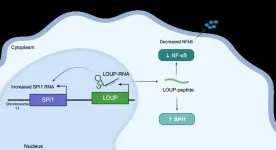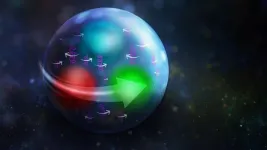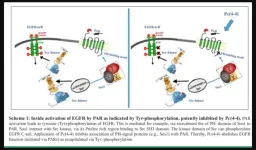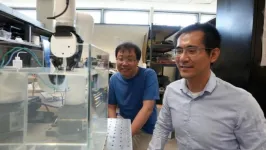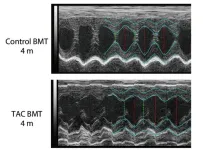(Press-News.org) Protest movements that reject political parties have an unintended consequence, according to new research from the University of Notre Dame: They empower savvy politicians who channel them to shake up the status quo.
The findings provide a framework for understanding recent global political realignments and offer lessons for activists who want to make a meaningful impact. They are particularly relevant in an era when mass protests have become an increasingly common tool to voice dissent with powerful institutions and draw attention to overlooked issues ranging from climate and conflict to inequality and human rights.
Ann Mische, associate professor of sociology and peace studies at the Keough School of Global Affairs at Notre Dame, and Tomás Gold, a Notre Dame doctoral candidate and doctoral fellow at the Keough School’s Kellogg Institute for International Studies, co-authored the study, published in the American Journal of Sociology. The authors received funding from the Kellogg Institute and the Nanovic Institute for European Studies, as well as Notre Dame’s Graduate School.
“Despite protesters’ strong rejection of parties, political parties have not ignored the protesters,” Mische said. “In fact, many partisan actors have found ways to use this hostility to their advantage, disrupting ‘politics as usual’ and contributing to political reconfigurations that surprised both actors and spectators.”
Mische and Gold analyzed data from the Varieties of Democracy Project, which provides several authoritative ways to measure democracy. The international project, widely cited by scholars, is affiliated with the Keough School’s Kellogg Institute.
Using the data, Mische and Gold analyzed 12 case studies across Europe, Asia, and North and South America between 2008 and 2016, amid the fallout of the global financial crisis and the ongoing rejection of parties that were seen as unable or unwilling to confront it.
They found that in response to massive anti-partisan protests, these countries generally experienced one of four outcomes: internal factional challenges within highly established parties (e.g., Labour leader Jeremy Corbyn in the United Kingdom); the emergence of new or renovated parties (Podemos, or “We Can,” an anti-austerity Spanish party); the formation of new anti-incumbent party coalitions (the Broad Front UNEN and Cambiemos coalitions in Argentina); and the rise of extreme populist leaders (such as Jair Bolsonaro in Brazil).
Mische and Gold said these varied outcomes could be explained by looking at the project’s data measuring parties’ institutional strength, the degree to which parties were cohesive or fragmented, and the overall numbers of viable political parties competing for power.
They used a comparative approach that bridged insights from sociology and political science, drawing on datasets to determine how the combination of these three variables generated different opportunities for political actors to navigate the challenges to the status quo. They complemented this analysis with a process-oriented account of how party-movement interactions contributed to these diverging pathways.
“We focused on how political elites can take advantage of the fact that they are rejected by protesters,” Gold said. “That paradox lies at the heart of this paper.”
Ultimately, Mische and Gold said, the study could serve as a cautionary tale to protesters who reject political parties rather than trying to negotiate with them. This rejection can paradoxically undermine activist goals by amplifying distrust in institutions and paving the way for populist demagogues.
“Sometimes you need social movements to challenge entrenched systems and respond to the needs and aspirations of the people,” Mische said, adding that further research could help explore the dynamics of insider-outsider coalitions for enacting reforms.
“But if you reject working with the state, then you cannot influence the development of policies that are important for the things that you care about. You may, instead, empower autocrats who don’t share your values but are adept at weaponizing institutional distrust. Understanding this dynamic is important to working for change and to strengthening global democracy at a time when institutions are increasingly under attack.”
Contact: Tracy DeStazio, associate director of media relations, 574-631-9958 or tdestazi@nd.edu
END
Political elites take advantage of anti-partisan protests to disrupt politics
2024-05-24
ELSE PRESS RELEASES FROM THIS DATE:
Tiny target discovered on RNA to short-circuit inflammation, UC Santa Cruz researchers find
2024-05-24
UC Santa Cruz researchers have discovered a peptide in human RNA that regulates inflammation and may provide a new path for treating diseases such as arthritis and lupus. The team used a screening process based on the powerful gene-editing tool CRISPR to shed light on one of the biggest mysteries about our RNA–the molecule responsible for carrying out genetic information contained in our DNA.
This peptide originates from within a long non-coding RNA (lncRNA) called LOUP. According to the researchers, ...
Charge your laptop in a minute? Supercapacitors can help; new research offers clues
2024-05-24
Imagine if your dead laptop or phone could charge in a minute or if an electric car could be fully powered in 10 minutes.
While not possible yet, new research by a team of CU Boulder scientists could potentially lead to such advances.
Published today in the Proceedings of the National Academy of Sciences, researchers in Ankur Gupta’s lab discovered how tiny charged particles, called ions, move within a complex network of minuscule pores. The breakthrough could lead to the development of more efficient energy storage devices, such as supercapacitors, said Gupta, an assistant professor of chemical and biological engineering.
“Given the critical role ...
Scientists discover CO2 and CO ices in outskirts of solar system
2024-05-24
ORLANDO, May 24, 2024 – For the first time, carbon dioxide and carbon monoxide ices have been observed in the far reaches of our solar system on trans-Neptunian objects (TNOs).
A research team, led by planetary scientists Mário Nascimento De Prá and Noemí Pinilla-Alonso from the University of Central Florida’s Florida Space Institute (FSI), made the findings by using the infrared spectral capabilities of the James Webb Space Telescope (JWST) to analyze the chemical composition of 59 trans-Neptunian objects and Centaurs.
The pioneering study, published ...
Theory and experiment combine to shine a new light on proton spin
2024-05-24
NEWPORT NEWS, VA – Nuclear physicists have long been working to reveal how the proton gets its spin. Now, a new method that combines experimental data with state-of-the-art calculations has revealed a more detailed picture of spin contributions from the very glue that holds protons together. It also paves the way toward imaging the proton’s 3D structure.
The work was led by Joseph Karpie, a postdoctoral associate in the Center for Theoretical and Computational Physics (Theory Center) at the U.S. Department of Energy's Thomas Jefferson National Accelerator Facility.
He said that this decades-old mystery began with measurements of the sources of the proton’s spin in ...
PKMYT1, a potential ‘Achilles heel’ of treatment resistant ER+ breast cancers with the poorest prognosis
2024-05-24
Up to 80% of breast cancer deaths occur in patients with tumors that express estrogen receptor-alpha. Although these estrogen receptor-positive (ER+) breast cancers often initially respond to standard treatment that combines endocrine therapies with CDK4/6 inhibitors, drug resistance often develops leading to lethal metastatic disease that spreads from the breast and does not respond to available treatments.
Looking to identify new vulnerabilities in this type of cancer that could lead to improved therapies, ...
PH-binding motifs as a platform for drug design: Lessons from protease-activated receptors (PARs)
2024-05-24
“We have identified binding motifs within the C-tails of PAR1,2&4, indispensable for cancer growth and development.”
BUFFALO, NY- May 24, 2024 – A new editorial paper was published in Oncoscience (Volume 11) on April 25, 2024, entitled, “PH-binding motifs as a platform for drug design: Lessons from protease-activated receptors; PARs.”
While targeted cancer therapy is greatly dependent on specific oncogenic pathways or conferred by genetic alterations, it remains yet challenging and somewhat disappointing. The high level of failure relies ...
Virginia Tech researcher creates new tool to move tiny bioparticles
2024-05-24
Undergoing surgery is seldom a pleasant experience, and it can sometimes be highly invasive. Surgical procedures have evolved steadily over the centuries, growing with the knowledge of anatomy and biology.
Innovative methods have also been bolstered with new tools, and a growth in the use of robotics since the 1980s has moved health care forward significantly. Assistant Professor Zhenhua Tian has pressed forward another step in the march of progress using robotics and noninvasive acoustics, and his team’s work has been published in Science Advances.
Robot-assisted surgery
Surgery using robots has been invasive since its invention because ...
On repeat: Biologists observe recurring evolutionary changes, over time, in stick insects
2024-05-24
LOGAN, UTAH, USA – A long-standing debate among evolutionary scientists goes something like this: Does evolution happen in a predictable pattern or does it depend on chance events and contingency? That is, if you could turn back the clock, as celebrated scientist Stephen Jay Gould (1941-2002) described in his famous metaphor, “Replaying the Tape of Life,” would life on Earth evolve, once again, as something similar to what we know now, or would it look very, very different?
“If you frame it as an either/or question, it’s too simplistic,” says Utah State University evolutionary biologist Zachariah Gompert. “The answer isn’t ‘completely ...
Understanding a broken heart
2024-05-24
The stress of heart failure is remembered by the body and appears to lead to recurrent failure, along with other related health issues, according to new research. Researchers have found that heart failure leaves a “stress memory” in the form of changes to the DNA modification of hematopoietic stem cells, which are involved in the production of blood and immune cells called macrophages. These immune cells play an important role in protecting heart health. However, a key signaling pathway (a chain of molecules which ...
Genetic cause of rare childhood immune disorders discovered
2024-05-24
Scientists have pinpointed genetic changes that can leave children born with little to no immune defence against infection.
In a new study of 11 affected individuals, researchers from Newcastle University, the Wellcome Sanger Institute, the Great North Children’s Hospital, and their collaborators were able to link mutations in the NUDCD3 gene to Severe Combined Immunodeficiency and Omenn syndrome1 – rare and life-threatening immunodeficiency disorders. These mutations prevented the normal development of diverse immune cells needed to combat different pathogens2.
The findings, published today (24 May) in Science Immunology, ...



